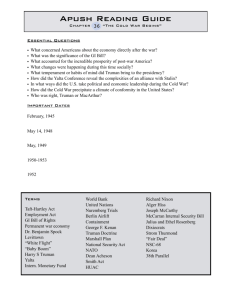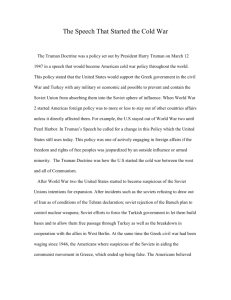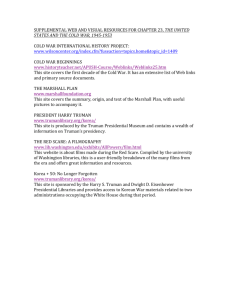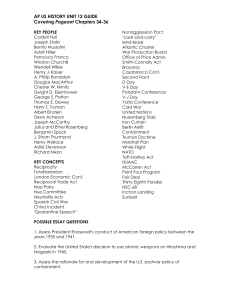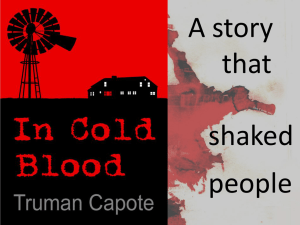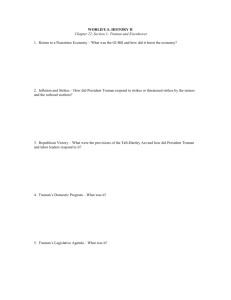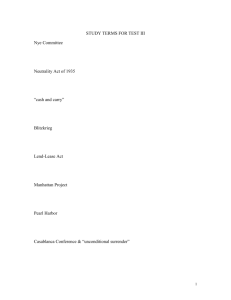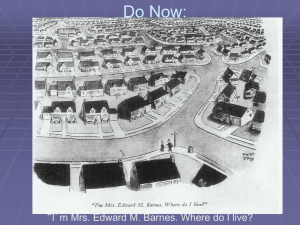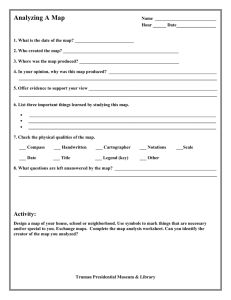truman doctrine - MissDWorldofSocialStudies
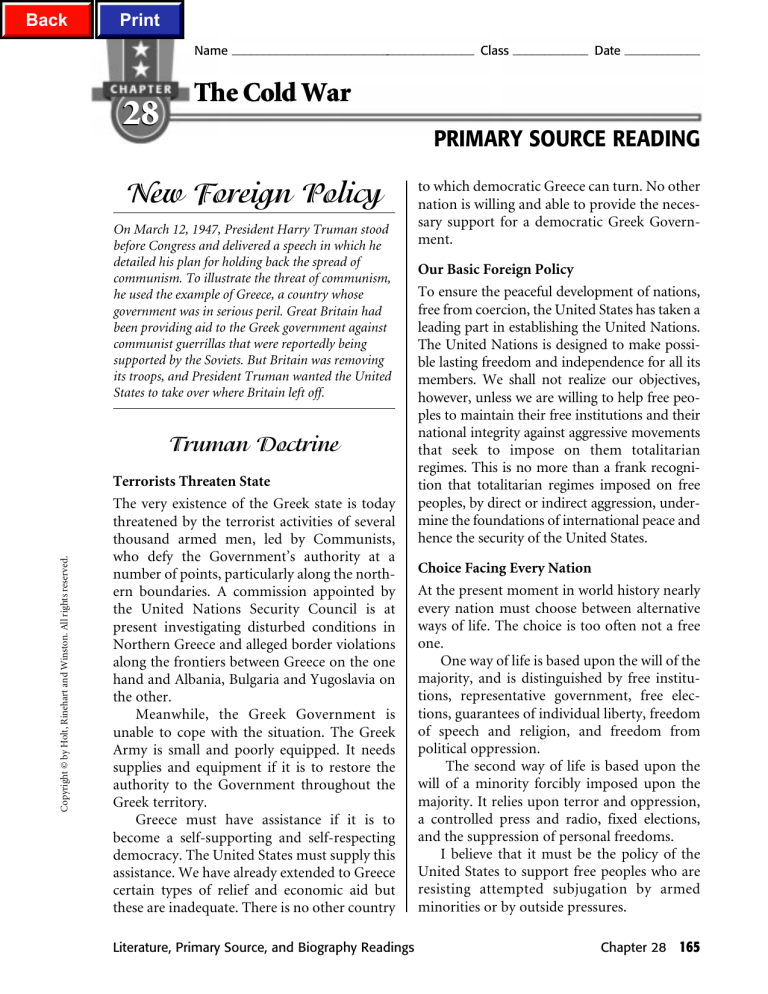
Back Print
Name _______________________________________ Class ____________ Date ____________
The Cold War
PRIMARY SOURCE READING
New Foreign Policy
On March 12, 1947, President Harry Truman stood before Congress and delivered a speech in which he detailed his plan for holding back the spread of communism. To illustrate the threat of communism, he used the example of Greece, a country whose government was in serious peril. Great Britain had been providing aid to the Greek government against communist guerrillas that were reportedly being supported by the Soviets. But Britain was removing its troops, and President Truman wanted the United
States to take over where Britain left off.
Truman Doctrine
Terrorists Threaten State
The very existence of the Greek state is today threatened by the terrorist activities of several thousand armed men, led by Communists, who defy the Government’s authority at a number of points, particularly along the northern boundaries. A commission appointed by the United Nations Security Council is at present investigating disturbed conditions in
Northern Greece and alleged border violations along the frontiers between Greece on the one hand and Albania, Bulgaria and Yugoslavia on the other.
Meanwhile, the Greek Government is unable to cope with the situation. The Greek
Army is small and poorly equipped. It needs supplies and equipment if it is to restore the authority to the Government throughout the
Greek territory.
Greece must have assistance if it is to become a self-supporting and self-respecting democracy. The United States must supply this assistance. We have already extended to Greece certain types of relief and economic aid but these are inadequate. There is no other country to which democratic Greece can turn. No other nation is willing and able to provide the necessary support for a democratic Greek Government.
Our Basic Foreign Policy
To ensure the peaceful development of nations, free from coercion, the United States has taken a leading part in establishing the United Nations.
The United Nations is designed to make possible lasting freedom and independence for all its members. We shall not realize our objectives, however, unless we are willing to help free peoples to maintain their free institutions and their national integrity against aggressive movements that seek to impose on them totalitarian regimes. This is no more than a frank recognition that totalitarian regimes imposed on free peoples, by direct or indirect aggression, undermine the foundations of international peace and hence the security of the United States.
Choice Facing Every Nation
At the present moment in world history nearly every nation must choose between alternative ways of life. The choice is too often not a free one.
One way of life is based upon the will of the majority, and is distinguished by free institutions, representative government, free elections, guarantees of individual liberty, freedom of speech and religion, and freedom from political oppression.
The second way of life is based upon the will of a minority forcibly imposed upon the majority. It relies upon terror and oppression, a controlled press and radio, fixed elections, and the suppression of personal freedoms.
I believe that it must be the policy of the
United States to support free peoples who are resisting attempted subjugation by armed minorities or by outside pressures.
Literature, Primary Source, and Biography Readings Chapter 28 165
Back Print
Chapter 28, Primary Source Reading, Continued
The world is not static, and the status quo is not sacred. But we cannot allow changes in the status quo in violation of the charter of the
United Nations by such methods as coercion, or by such subterfuges as political infiltration.
In helping free and independent nations to maintain their freedom, the United States will be giving effect to the principles of the charter of the United Nations.
From “Text of President Truman’s Speech on New
Foreign Policy.” The New York Times , March 13, 1947.
UNDERSTANDING WHAT YOU READ
After you have finished reading the selection, answer the following questions in the space provided.
1.
According to the Truman Doctrine, what is the purpose of the United Nations?
2.
What are the two primary ways of life that Truman identifies?
3.
What is the “Choice Facing Every Nation”?
4.
What do you think Truman meant when he said that the world was not static and the status quo was not sacred?
5.
What do you think was the primary fear underlying this message to Congress?
ACTIVITY
Imagine that you have just heard the president’s speech to Congress, and now you must report on it for a radio station. Make notes on the ideas presented in the
Truman Doctrine, and then write a brief newscast delivering the highlights of the speech. Be discriminating about the information and incorporate some quotes.
166 Chapter 28 Literature, Primary Source, and Biography Readings
Back Print
PRIMARY SOURCE
1.
to create and maintain lasting freedom for all its members
2.
democracy—a way of life based upon the will of the majority and distinguished by free institutions, representative government, free elections, guarantee of individual liberty, and freedom of the press; communism—the will of a minority forcibly imposed upon the majority, a system that relies on terror and oppression, a controlled press, fixed elections, and suppressed individual freedom
3.
democracy or totalitarianism
4.
Truman meant that even though the world was in great turmoil and experiences monumental change, we should not give up what we know to be right.
5.
Truman’s fear that communism might spread to the United States, imperiling the American way of life
ACTIVITY
Students’ responses to the exercise will vary.
Information for the newscast should be drawn directly from the selection.
BIOGRAPHY
1.
Bunche was valedictorian of his high school and earned his doctorate from
Harvard.
2.
Students’ thoughts on whether this was conducive will vary.
3.
He organized the Joint Committee on
National Recovery, helped to form the
National Negro Congress, was on the board of directors of the NAACP, and was active in key civil rights marches.
4.
He negotiated the armistice between the warring Arabs and Jews during the partition of Palestine by the United Nations.
ACTIVITY
Students’ letters should indicate an understanding of the wonderful role model that
Bunche might have been for his students.
CHAPTER 29
LITERATURE
1.
They are attending a movie at a theater to which few African Americans come.
2.
It makes them seem as though they are intruders who do not belong, inferiors who do not deserve the same attention as white patrons, although Maud Martha knows they have every right to be there.
3.
Their kit’n’t apartment is small and poor and exposed to garbage, roaches, and rats.
They imagine the other homes to be sweet-smelling, gleaming, comfortable, and richly furnished.
4.
They have been able to enter the makebelieve world and forget their troubles.
They do not want the lights to reveal the differences between them and the white audience, and they anticipate being mistreated.
5.
Answers will vary but should point out that they glamorize the white world which they cannot enter comfortably and ultimately resent it for making them feel inferior. Entering white society makes them giddy, fearful, and finally profoundly sad.
ACTIVITY
Responses will vary but may include ideas for integrating schools; creating better housing, playgrounds, libraries, and shopping areas in poorer areas; adding police to enforce civil rights legislation; generating funds and special loans to help minorities buy homes and businesses in prosperous areas; and creating task forces and social groups that bring multiracial groups together.
PRIMARY SOURCE
1.
four
2.
Sammy Davis Jr., Peter Lawford, Joey
Bishop, and Nancy Sinatra
3.
Answers will vary. Students may mention how Sinatra hated all rock ’n’ roll music, including music by Elvis, or how Sinatra thought Elvis’s music was “deplorable” or
“rancid-smelling aphrodisiac.”
4.
He loved attention and he felt rock ’n’ roll
Literature, Primary Source, and Biography Readings Answer Key 241
